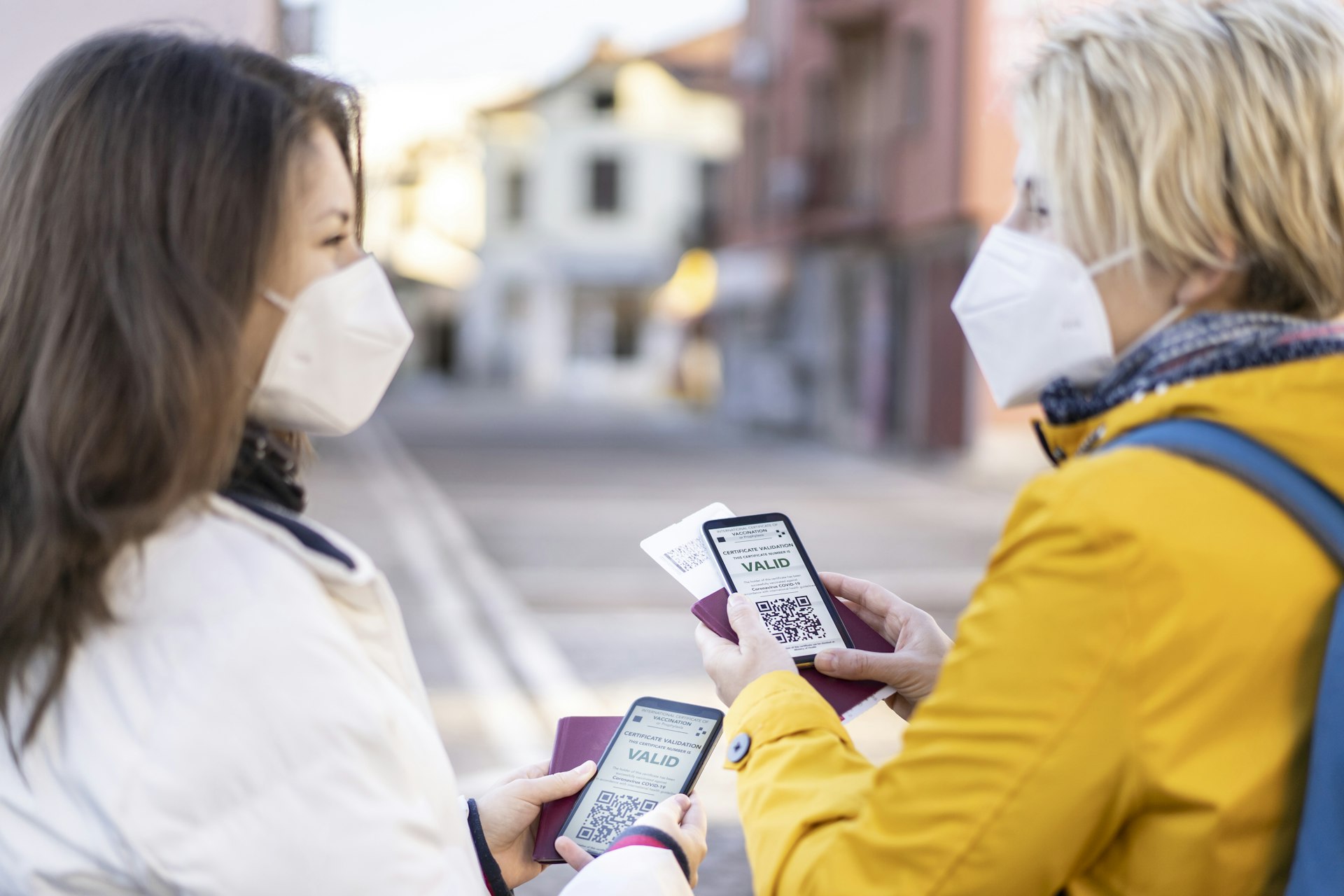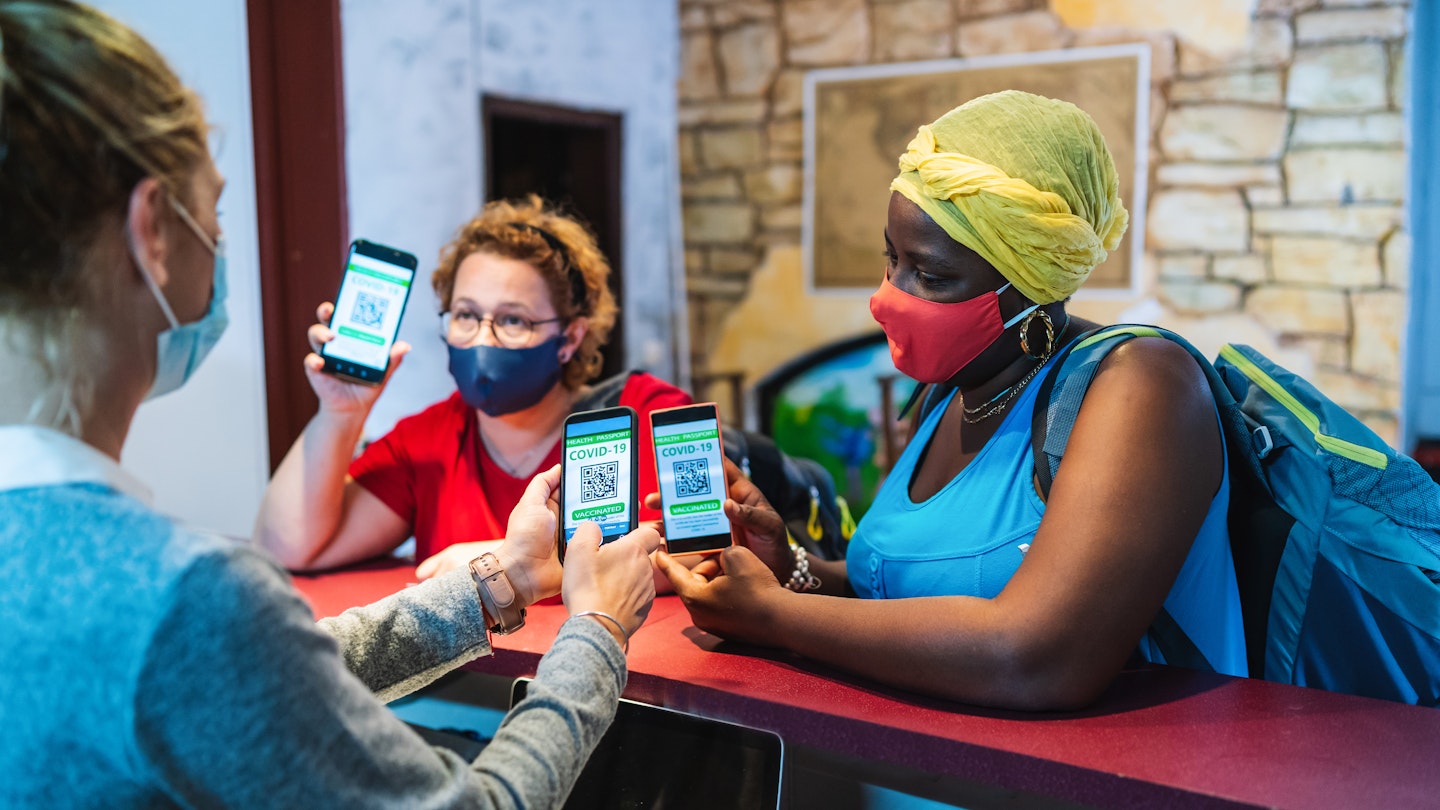When I moved to Vienna last summer, proudly touting my American CDC card with the two doses of BioNTech/Pfizer I received in the United States, I was thrilled to get back to so many of the things we’d missed over the course of the coronavirus pandemic: Meeting friends in restaurants and bars, having visitors from back home, and traveling stress-free around Europe.
But a few weeks later, when the European Union introduced its EU Digital Covid Certificate system, my white paper CDC card started to feel a little flimsy by comparison. I worried that despite being vaccinated, I’d have issues getting around Austria and Europe without the QR codes and mobile apps used by different EU countries.
As an American who’s lived in Europe for nearly five years, first in Berlin and now in Vienna, I’m used to the small inconveniences and logistical details that come with long-term life abroad — but the pandemic, and the advent of vaccination requirements, have taken those regular considerations to a new level.
Danube deep, mountain high: The 12 best places to visit in Austria
Thankfully, my initial concerns about getting around with a CDC card were largely proven wrong: Using it to access things like restaurants and hotels has been no problem, although I’ve heard of a few cases where friends or their visitors have been questioned.
With many European countries — including Austria — beginning to lift most pandemic-related restrictions in the coming weeks, proving you’re vaccinated might not be such a constant fact of life here anymore. Still, given how unpredictable and fast-changing pandemic-era measures have been, it’s good to be prepared for what might be necessary again down the line.
Using My CDC Card in Europe
In general, a CDC card has gotten me everywhere the digital Covid pass does: Whether in Austria or on trips I’ve taken to other countries around Europe, including Greece, Hungary and France, I and my travel companions have had no issues using it.
Although some of the people who checked my vaccine records initially looked a bit confused when I pulled out a small white card instead of the local Covid app, most quickly understood what it was. Occasionally, I would have to briefly explain that it’s the official vaccination record in the US.
That mainly happened at smaller cafés and places off the beaten tourist path: At frequently visited spots — including major tourist attractions and the border health check at the Vienna airport, for example — people seemed to recognize the CDC card fairly quickly.
And in general, people checking my CDC card were mainly looking to make sure there was the correct number of vaccine doses listed, and seemed less concerned with where the vaccination record had come from.

Whether my vaccination pass is actually checked — and how closely it’s been scrutinized — varies from restaurant to restaurant and city to city. Sometimes people would ask for an ID along with it, but often it’s been just a cursory glance.
For example, Germany now requires proof of either vaccination, recovery from the virus or a negative test to travel on trains and public transit across the country. On a recent trip back to Berlin, officers went through the train checking everyone’s Covid documentation shortly after we crossed the border into Germany. But on other train trips, no one has asked for it at all.
In an effort to cut down on fraudulent Covid certificates, more and more venues in Germany and Austria have been actually scanning QR codes and asking to see IDs in recent months. Back in November and December, many of Vienna’s Christmas markets, including the famous one at Rathausplatz, scanned QR codes at the entrance and matched them with our IDs when we came in. (A CDC card and a photo ID was fine as well.)
While this has never happened to me, I have heard of isolated cases who’ve been turned away from venues with a CDC card. A friend’s mother visited Vienna from the US after the holidays and tried to enter one Vienna museum with her CDC card, but was told she needed a European QR code to come in.
When I asked Austria’s national tourism authority about that incident and the rules for tourists, they said using the QR code isn’t required and that another form of proof, including a CDC card, should always suffice. Venues that require proof of vaccination should accept a foreign vaccination record as long as it’s clearly written in either English or German, a spokesman told me.
One other thing to keep in mind is the rules for how long your vaccinations are valid, which have changed recently in some EU countries. As of Feb. 1, Austria considers your vaccinations to be valid for just six months after your second dose, instead of nine; after that point, you’ll need a booster in order to gain access to restaurants, hotels and other venues.
The Well-Traveled Path: What is your exit strategy for the pandemic?
Tips For Seamless Travel in Europe
When it comes to pandemic-era traveling, I tend to apply the same lesson I’ve learned dealing with German and Austrian bureaucracy: The best thing you can do is to come armed with as much information and documentation as possible.
For example, the state of California, where I received my first two doses, sent me an email after my appointment with a more detailed record of my vaccinations than what’s listed on my CDC card. I’ve never really needed it, but have brought it out to, for example, show airline desk staff when flying from the US to Germany or Austria or eventually help me get my Austrian QR code. If your state or vaccination center offers something like that, it’s helpful to have it printed out before your trip to make it clear you’re prepared.
There are other ways to be extra safe when it comes to carrying around adequate proof of vaccination, too. In both Germany and Austria, for example, people are used to having all their jabs recorded in small yellow vaccination booklets (the same internationally-accepted ones you’d get in the US for typical travel vaccines). When I received my two doses of vaccine in California, I asked the pharmacist to record the doses in my yellow vaccination booklet as well.
Even though my CDC card never presented any issues, now that I have an EU digital certificate I can say it certainly makes things go more smoothly. It’s not always possible for tourists to get a QR code, but some countries do allow it. If you’re taking a multi-country trip, it might be worth seeing if the first country on your itinerary offers options for you: France, for example, will convert your CDC vaccine records into an EU-approved QR code in pharmacies for a fee.
For more information on COVID-19 and travel, check out Lonely Planet's Health Hub.
You might also like:
Explained: What do France's health and vaccine pass rules mean for tourists?
England drops COVID-19 tests for vaccinated arrivals - here are the latest travel rules
Ireland lifts (almost) all COVID-19 restrictions












